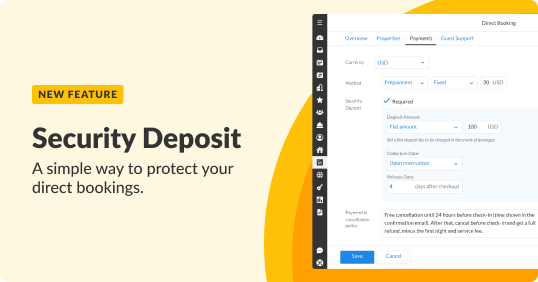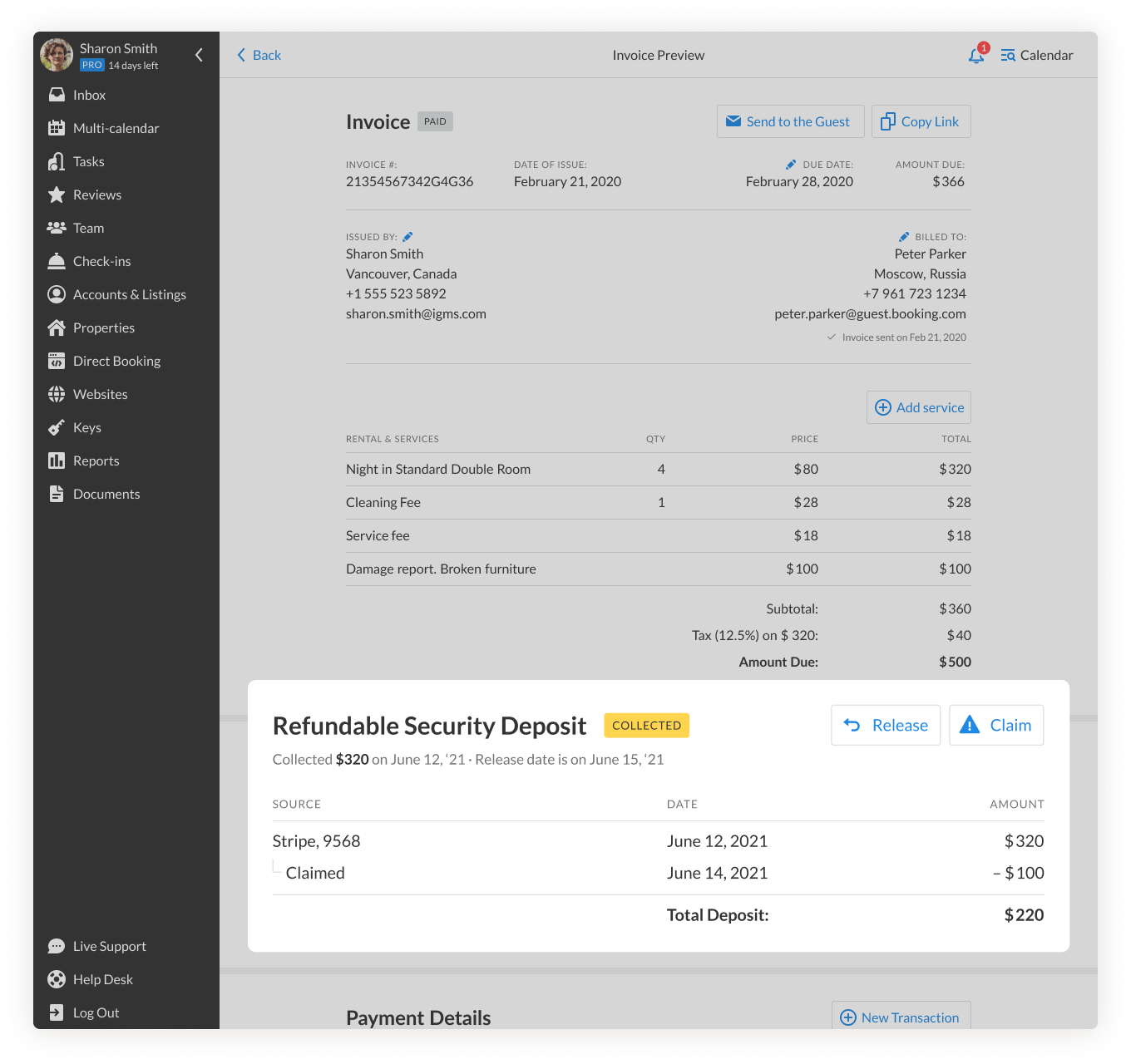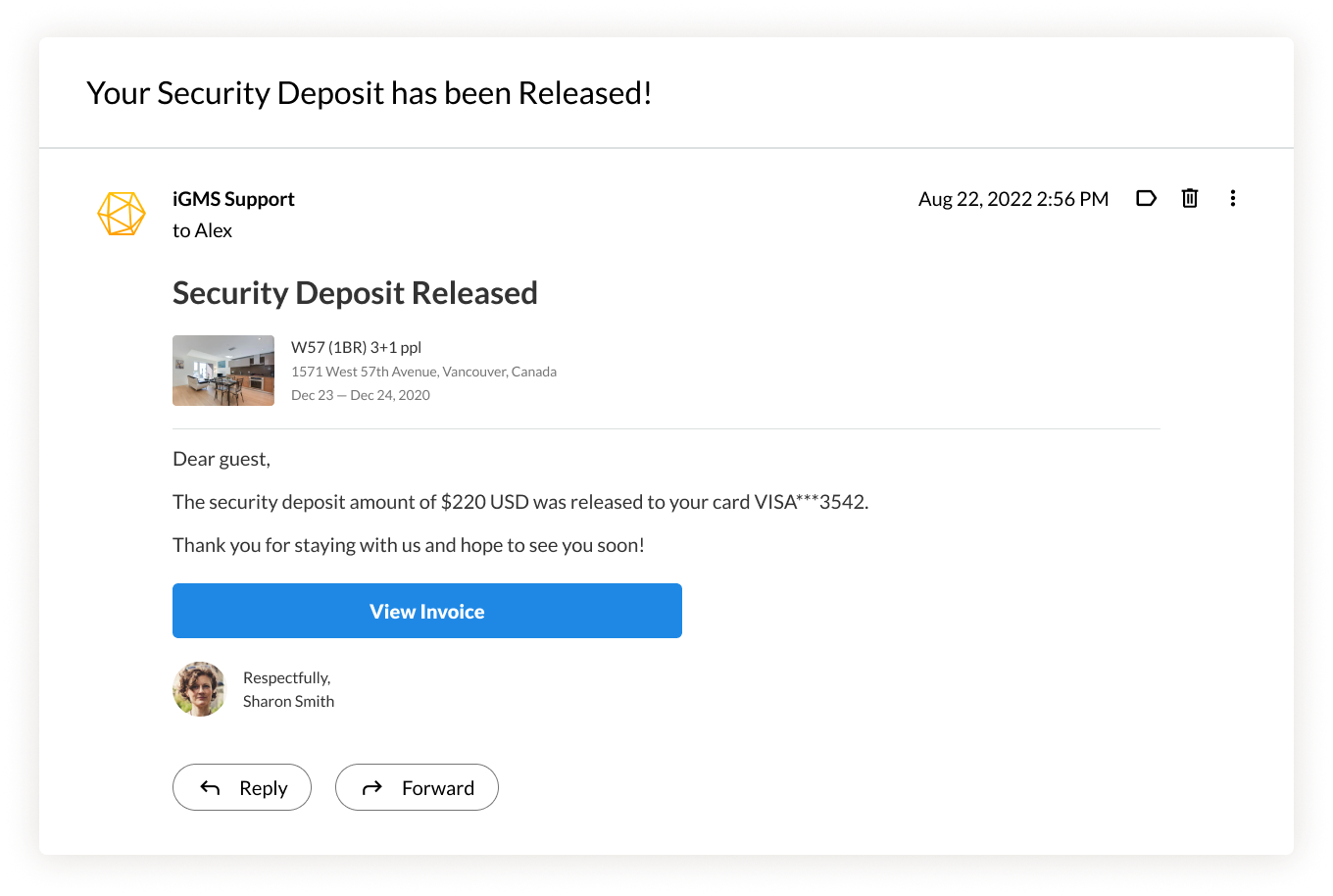iGMS Security Deposit: How It Works And What You Should Know

Every short-term rental manager wants to protect herself from financial risks. If you are following the current hot trend and exploring direct bookings, it’s time for you to think of how to protect your rentals properly from potential losses.
Even though some damage might not be intentional, you still need to keep someone accountable for the resulting expenses on your side. Here at iGMS we decided to go one step further and release a smart functionality on top of our direct booking engine — the Security Deposit.
It’s a new feature that helps you to collect a dedicated amount of each direct booking to cover the costs of potential damage. However, if everything is good at the end of the stay, the guest will not pay anything extra and the collected amount will be released to the guest again.
If you are not an iGMS user yet, maybe it’s high time to level up your game with direct bookings and try the Security Deposit feature in action.
What is a security deposit?
In the short-term rental industry, a security deposit is an amount of money that the guest has agreed to pay to cover the costs of potential damage that might occur during their stay. In case of no damage, the full amount will be returned to the guest. What’s important to remember is that a security deposit is not a part of your income unless you claim it at the end of the guest’s stay.
Let’s say, for example, you need to fix something because it was broken by a guest, or an extra cleaning is required. In this case, the money can be deducted from the agreed sum of the deposit to cover it before returning the rest. For example, the whole sum of a security deposit was $200, and you spent $95 for an extra cleaning once the guests left. In this case, you can claim $95, and $105 will be returned to the guest.
How does a security deposit work on Airbnb and other booking platforms?
Different booking platforms approach security deposits differently. What you need to take into account is that the security deposit return is bound by the local regulations.
Check with the local authorities and make sure that you are not breaking any laws.
Some areas allow for a security deposit to be returned up to 14 days after the guest has left, but we recommend returning it as soon as possible, once you ascertain that no damage was done to the property.
Here’s how other booking platforms handle a security deposit:
-
- Airbnb: Airbnb allows hosts to claim the deposit 48 hours after the checkout. If you missed the deadline, you will not be able to claim the deposit, since the guest’s credit card information is erased after that.
- Booking.com: You can place a hold on your guest’s credit card during their stay at the time of reservation or when the guests arrive.
- Vrbo: On Vrbo, you have an option of collecting the security deposit yourself as a merchant. You can do this at the time of reservation or at check-in.
How does a security deposit work in iGMS?
With iGMS, you can easily handle the security deposit collection return for your direct reservations. The only thing you will need to be in place is a connection with Stripe in your iGMS account.
Here are some obvious benefits of the iGMS security deposit:
Know that your rentals are protected
You can be sure that all direct bookings coming from your website or through social media are real and profitable for your business.
Have full control over your deposit claim process
Unlike other OTAs, iGMS allows you to claim the security deposit right away, and the guest will receive an instant notification about it.

Allow flexibility in the security deposit amount
You can charge a flat amount, a percentage of the booking or both, depending on what works best for you.

Have a fully automated release process
You can set a specific day after the checkout when the deposit will be released, which is hassle-free for you and your guests.
Once you’ve decided that you want to protect your direct bookings, you can apply the appropriate settings to all your direct booking listings in the iGMS interface. You can set the collection date, the amount, and the number of days after checkout when a security deposit will be released.

What type of damage can I cover with the iGMS security deposit?
It’s completely up to you what type of damage you’d like to cover with your security deposit, there are no restrictions on it from iGMS’ side.
Here are just a couple of suggestions for you to get started:
- Occasional damage (including theft and additional cleaning services)
It’s quite common. If you need to invite a special cleaning crew, or you’ve noticed that something is missing in your rental, it’s a good idea to withhold a part of the deposit. Make sure to assess the condition of your rental properly and decide whether it’s worth the hassle. In some cases, guests can leave a negative review if the damage was not severe enough to warrant it.
- Severe damage
Once in a lifetime, a disaster happens. If you find broken furniture or a missing TV, it calls for some action. However, make sure that the damage was intentional, and your guest is, in fact, at fault for what happened. It might be too obvious to blame the guest right away, but keep in mind that a negative review can follow after that as well, especially if the guests feel they are treated unfairly.
Important! A security deposit should not be charged for regular wear-and-tear situations. It’s obvious that over time some things become old and in need of repair or replacement. You cannot really say that the last guest who was the last straw on the camel’s back is at fault. Make sure to adjust your rates and pricing strategy accordingly to cover for this type of extra expenses from your side.
How much should a security deposit be?
It depends on the type of vacation rental business you are running, but should also not scare your potential guests off. The more expensive your apartment, the more it makes sense to put a hold on a greater sum. However, if you have just a tiny apartment, it will be strange to charge a security deposit that’s more than a half of the guest’s stay.
Moreover, some local regulations might apply to short-term and long-term rentals. It’s better to check with your local legislation about it to make sure you comply with the law.
In this article, we will focus primarily on security deposits for short-term rentals.
In iGMS, you have several options on how to charge your security deposit.
- Flat amount
You can set a sum for your security deposit to be collected regardless of how much the total payout for the stay is. It’s good if you understand precisely what type of damage you need to cover or have an assessment of the maximum amount that needs to be covered.

- Percentage
If you are not sure about how much to charge for the flat amount, you can always decide on a percentage. It’s calculated based on the base price per night. Check with your local laws and regulations to make sure you are not charging more than allowed. For example, in some areas, you cannot charge more than 30% of the booking cost.

- Percentage or flat amount
Sometimes you can use both options and set the flat amount as well as the percentage. In this case, the greater amount will be charged as a security deposit. For example, you set a flat amount of $100 but if the percentage is $120, the latter will be the security deposit for this reservation.
Other ways to protect your property when renting directly
Charging a security deposit is one of the most popular ways to protect your property from damage and make sure your guests are real people and not scammers. However, there are other ways you can bulletproof your rental and profit from the constant turnarounds.
- Get a short-term rental insurance policy to protect yourself in case anything happens. There are quite a few options available, but some do not offer coverage for short-term rentals. You can consult with a real estate lawyer for your specific case or check our trusted partners.
- Draft a vacation rental agreement or host-guest contract that will highlight the most important rules and regulations. You can find some examples and templates online, but make sure to customize it for your specific situation.
- Charge a damage waiver fee. Although it’s not ideal, it’s another way of protecting the property. The main disadvantage is that, unlike a security deposit, the fee is non-refundable.
- Install smart locks, doorbell cameras, and noise sensors in your property. If you are looking for a specific vendor, iGMS has a couple of partners to get started.
All in all, there are quite a few things, but the iGMS Security Deposit is your foundation on which you can build a better security system for your rentals.
Why not try out all the iGMS tools for yourself? We would like to invite you to join our weekly live webinars and start your free 14-day trial.
Here at iGMS we’re committed to helping hosts make the most of their business — more updates coming up soon!






